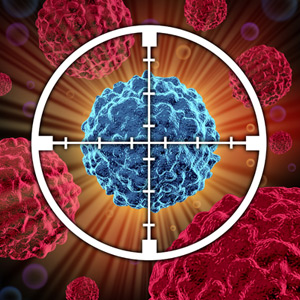 Targeted therapies are a newer approach to cancer treatment and a major focus for research. These therapies use medications or other substances to stop the growth and spread of cancer.
Targeted therapies are a newer approach to cancer treatment and a major focus for research. These therapies use medications or other substances to stop the growth and spread of cancer.
Targeted therapies work by focusing on the ways cancer cells act differently from healthy cells and interrupting these processes. They “target” processes that play an important role in cancer growth so that cancer cells are unable to increase. An example of this would be stopping blood vessels that “feed” cancer cells, or interfering with signals that the cancer cells need for growth. While each type of targeted therapy works differently, they all aim to disrupt the way cancer cells duplicate and interact with other cells.
Targeted therapies can be used alone or in combination with other treatments, such as chemotherapy and radiation. When used in combination, targeted therapies can improve the effectiveness of other treatments.
Side effects of targeted therapies vary widely among the different types of medications. When side effects do occur, they are generally milder than side effects from other cancer therapies and go away at the end of treatment. In rare cases, patients have had allergic reactions to some therapies.
For further information on new targeted therapies being developed, go to www.clinicaltrials.gov.
